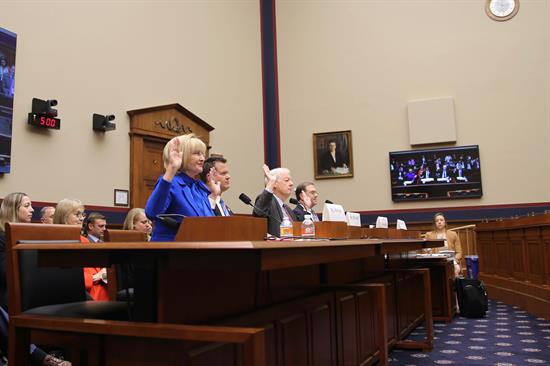Press Releases
Subcommittee Hearing Examines Expanding Affordable Health Care for All
WASHINGTON,
March 20, 2018
Today, the Subcommittee on Health, Employment, Labor, and Pensions, chaired by Rep. Tim Walberg (R-MI), held a hearing on “Expanding Affordable Health Care Options: Examining the Department of Labor’s Proposed Rule on Association Health Plans (AHPs).”
Today, the Subcommittee on Health, Employment, Labor, and Pensions, chaired by Rep. Tim Walberg (R-MI), held a hearing on “Expanding Affordable Health Care Options: Examining the Department of Labor’s Proposed Rule on Association Health Plans (AHPs).”
Coinciding with the eighth anniversary of the passage of Obamacare, the hearing focused on how current law is having a negative impact on the ability of small businesses to provide affordable health care to its workers. “Since Obamacare became the law of the land, America’s small businesses have struggled to dig themselves out from under the law’s crushing weight,” said Rep. Walberg. “The financial burden this law has placed on Main Street businesses has been debilitating, with its costs and mandates amounting to an estimated $19 billion in lost wages for small business employees.” “Time and again, those of us on this Committee have heard from small business owners that one of their greatest concerns is the high cost of health insurance,” he said. Catherine Monson, CEO of FASTSIGNS International, Inc., explained how Obamacare is impacting franchises within her own company. “While employer-sponsored coverage remains the most common source of health care coverage in the United States, a smaller proportion of people are covered by employers than a decade ago,” she said. “There’s also a bigger gap today between the health insurance large firms can access and afford for their employees and what small firms can provide.” The Committee on Education and the Workforce has listened to the concerns of America’s small business owners, and advanced legislation to provide small businesses the ability to join together through AHPs to strengthen their bargaining power in the health insurance market in order to secure health coverage options on par with that of larger companies and unions. Sponsored by Rep. Walberg, the Small Business Health Fairness Act (H.R. 1101) would expand health care coverage and lower costs for workers by empowering small businesses to band together through AHPs and negotiate for lower costs on behalf of their employees. The House of Representatives passed the Small Business Health Fairness Act on March 22, 2017. Christopher Condeluci with CC Law & Policy said AHPs are “critical for national trade associations, franchisees, and companies with ‘cooperative’ members. For decades, these types of employer groups have wanted to offer some type of health coverage to their employer members through a fully-insured or self-insured AHP on a nationwide, or a regional basis,” Condeluci said. Praise for the expansion of AHPs was also reiterated by Michael McGrew, CEO of McGrew Real Estate in Lawrence, Kansas. “Affording more freedom to individuals to choose from a variety of insurance providers offering quality coverage plans should be supported across all industries and will be key to cultivating a deep participant pool and strong marketplace,” he said. Not only has the Committee on Education and the Workforce taken action to provide access to AHPs, but the Department of Labor (DOL) proposed a rule in January to broaden the criteria for determining when employers may join together in an employer group or association in order to form an AHP. “This recent action by DOL presents an opportunity to examine the Department’s plan to expand small business access to affordable health care options, and thereby decrease the number of uninsured individuals,” Rep. Walberg noted. McGrew said, “The Department’s removal of regulatory barriers that make it possible for self-employed individuals and small employers to purchase health insurance through a professional or trade association has the potential to expand much needed access to AHPs.” “It is important to emphasize that one of the main reasons why employers offer health coverage to their employees – even through an AHP – is to attract and retain talent,” Condeluci remarked. “A strong argument can be made that to remain competitive among their peers, employers – especially those offering health coverage through an AHP – are going to make sure that their plan offers a comprehensive level of health coverage so they can attract and retain talented workers.” Recently, Rep. Virginia Foxx (R-NC), chairwoman of the Committee on Education and the Workforce, and Rep. Walberg submitted comments to DOL calling on the administration to consider provisions included in the Small Business Health Fairness Act as DOL works to expand access to AHPs to benefit American workers and families. # # # |
Browse News
Stay Connected

